Key takeaways:
- Blockchain technology enhances transparency in philanthropy by providing a secure, tamper-proof ledger, allowing donors to track donations and see their impact in real-time.
- Cryptocurrency donations offer benefits such as lower transaction fees, faster transfers, global reach, and potential tax advantages, increasing donor engagement and contributions.
- Challenges like cryptocurrency volatility, complexity of technology, and regulatory issues must be addressed to expand participation and trust in blockchain philanthropy.
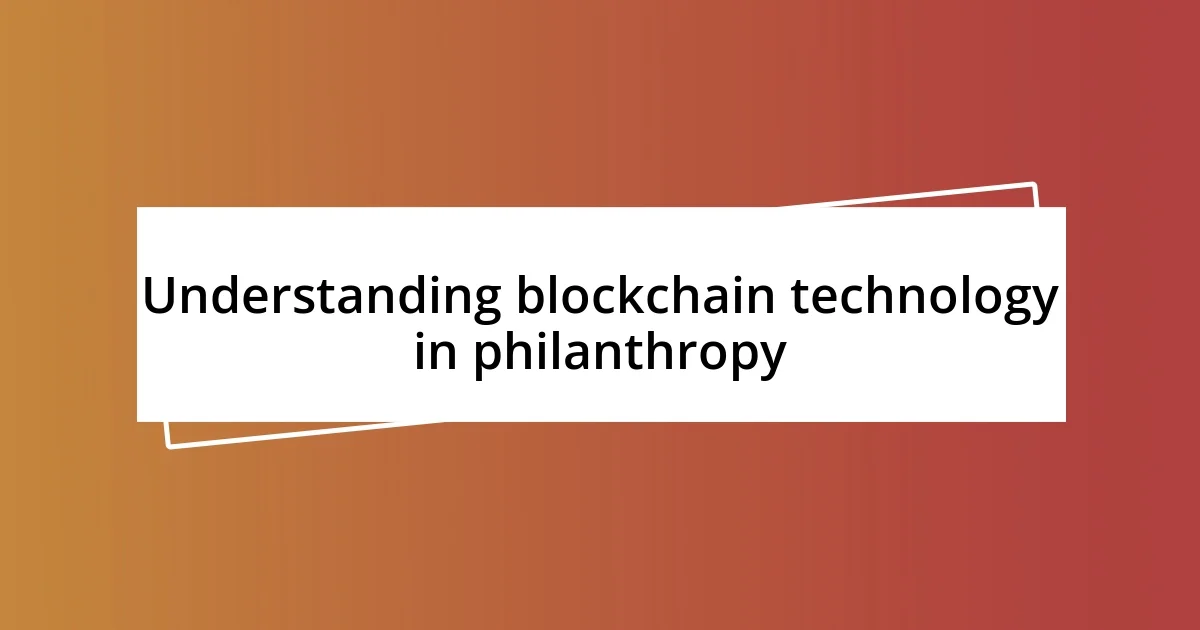
Understanding blockchain technology in philanthropy
Blockchain technology is truly fascinating, especially when you consider its potential in philanthropy. Imagine a world where every donation can be tracked transparently, ensuring that funds reach their intended purpose. I remember a project I got involved with where blockchain made it possible for donors to see the impact of their contribution in real-time—it felt empowering to connect with the cause so directly.
When I first encountered blockchain, I was intrigued by how it functions as a secure and tamper-proof ledger. This technology allows organizations to verify transactions without relying heavily on intermediaries. It’s like having a digital safety net. Don’t you think it’s remarkable how this can not only enhance trust but also inspire more people to give?
Consider the emotional aspect of giving; knowing that your money is directly supporting a cause can make all the difference. I’ve seen firsthand how the immediacy of feedback in blockchain-supported projects fosters a stronger community spirit. It opens up a dialogue between donors and beneficiaries, which can lead to deeper connections and greater collective impact. How often do we get that kind of involvement in traditional philanthropy?
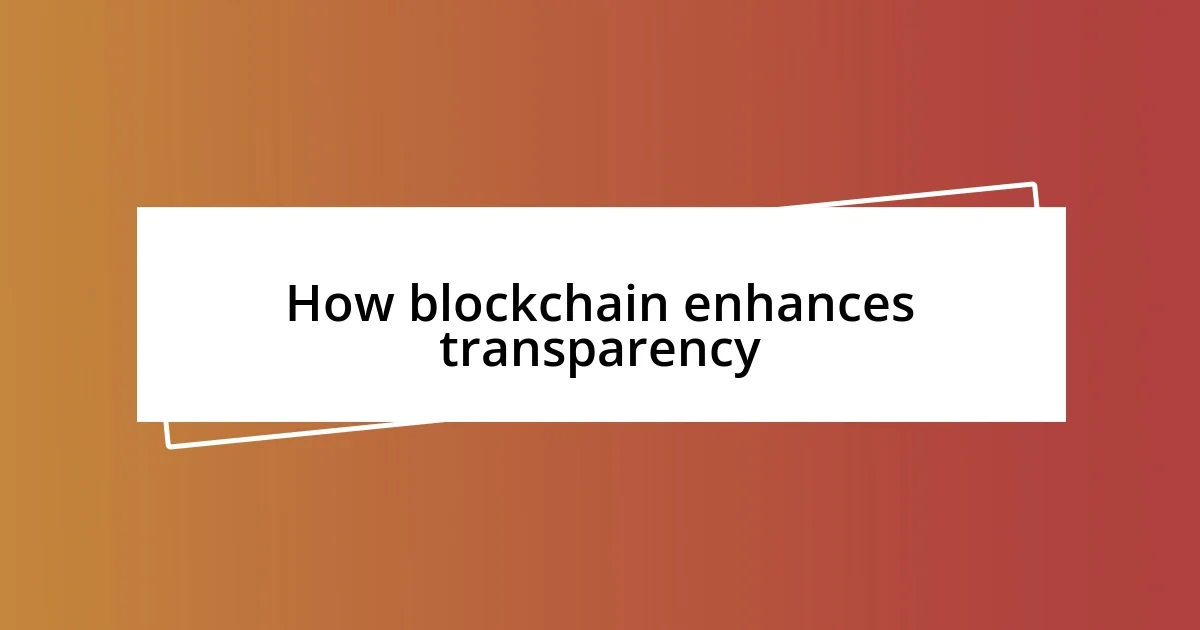
How blockchain enhances transparency
Blockchain enhances transparency in philanthropy in extraordinary ways. By providing a permanent and unchangeable record of every donation, it ensures that all transactions are open for scrutiny. I recall attending a fundraiser where the organizers shared a live dashboard powered by blockchain. It showcased real-time updates on funds raised and how they were allocated. That level of openness connects donors with the cause while eliminating doubts about mismanagement.
When we talk about trust, blockchain’s decentralized nature plays a huge role. It removes the need for a central authority to oversee transactions, which means that donors can have direct access to transaction details. I once donated to a charity using a blockchain platform, and I was surprised and delighted to see a detailed breakdown of how each dollar was spent. This kind of clarity not only reassures donors—it also encourages them to contribute more, knowing their generosity will be effectively utilized.
Moreover, the impact of blockchain on accountability shouldn’t be overlooked. Every participant in the supply chain, from the donor to the beneficiary, is part of the same network. One personal experience that stands out is when I witnessed a project using blockchain to trace funds through to their end-use. The sense of security and validation was palpable in the room; everyone knew their contribution was making a real difference. It’s inspiring to think that such tools can revolutionize giving at a fundamental level.
| Traditional Philanthropy | Blockchain-Based Philanthropy |
|---|---|
| Limited Transparency | Full Transaction Visibility |
| Centralized Control | Decentralized Verification |
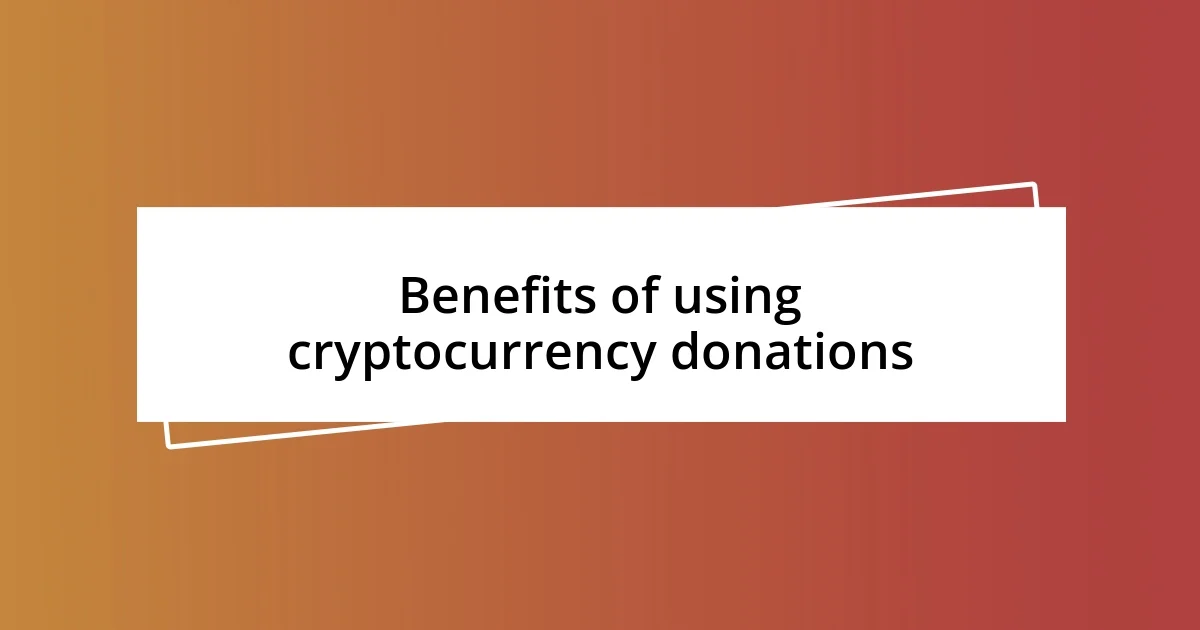
Benefits of using cryptocurrency donations
Using cryptocurrency for donations comes with a host of benefits that can truly enhance the giving experience. One standout advantage is the speed of transactions. I recall a situation where my donation reached a charity in a matter of minutes, rather than the days it typically takes through traditional methods. This immediacy not only helps the organizations respond quickly to needs but also brings a sense of urgency to the cause we’re supporting.
Consider the following benefits of cryptocurrency donations:
- Lower Transaction Fees: Many cryptocurrency platforms charge minimal fees compared to credit cards or bank transfers.
- Global Reach: Cryptocurrency allows donations to be made across borders without the complexities of currency conversion.
- Tax Benefits: In some regions, donating cryptocurrency can give tax advantages, as it might be considered a capital gains donation.
- Anonymity: Donors can choose to remain anonymous if they wish, which can create a more comfortable giving environment.
Additionally, the fact that cryptocurrency is decentralized means we can support causes without relying on intermediaries that may collect commissions or fees. I remember a fundraising event where we used cryptocurrency, and the organizers were able to allocate an impressive percentage of each donation directly to the beneficiaries. This made me feel more connected and impactful, knowing that my contribution wasn’t getting siphoned off through administrative costs.
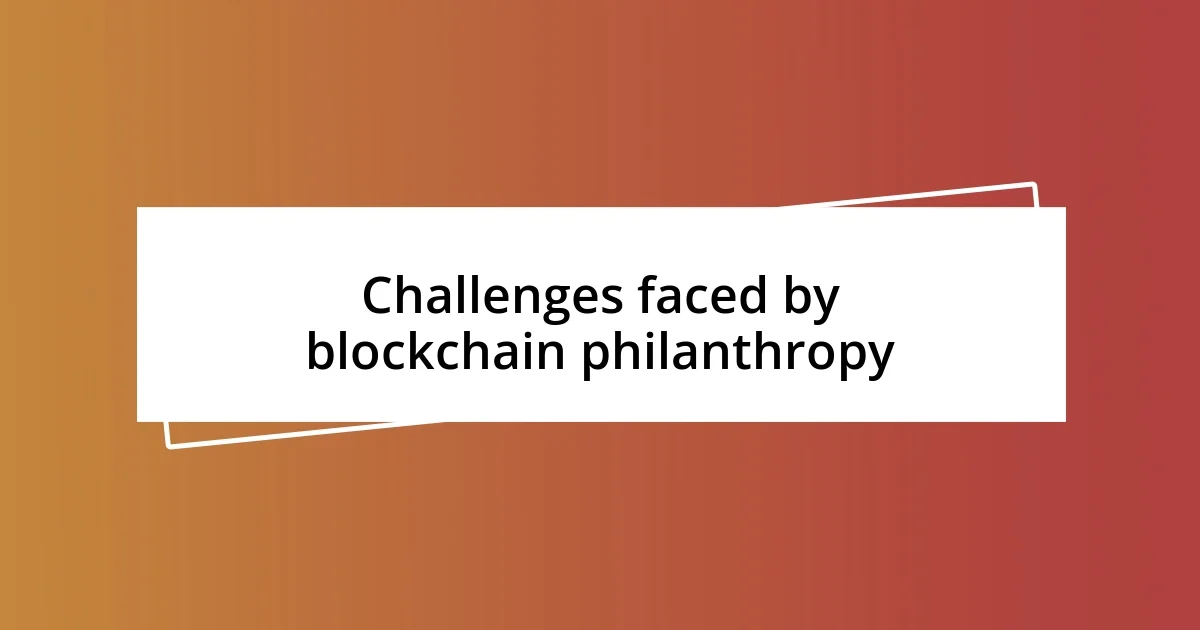
Challenges faced by blockchain philanthropy
Navigating blockchain philanthropy is not without its hurdles. One significant challenge is the volatility of cryptocurrencies. I can clearly remember a time when I was thrilled to support a project, only to see the value of my donation fluctuate wildly within days. This uncertainty can deter potential donors who may feel wary about how much of their generosity will ultimately reach those in need.
Another obstacle lies in the complexity of the technology itself. When I first encountered blockchain-based platforms, I felt overwhelmed. The jargon and technical details can alienate individuals who want to contribute but lack the tech-savvy background. This makes me wonder—how can we bridge that gap to ensure everyone has access to these innovative giving methods? Making these platforms user-friendly is essential if we want to expand participation in blockchain philanthropy.
Moreover, regulatory issues often loom large over blockchain initiatives. I recall attending a discussion where experts voiced concerns about compliance with local laws. The landscape is evolving, and for many organizations, navigating these regulations can be a daunting task. It’s crucial to create an environment that fosters innovation while ensuring legal standards are met, allowing blockchain philanthropy to truly flourish.
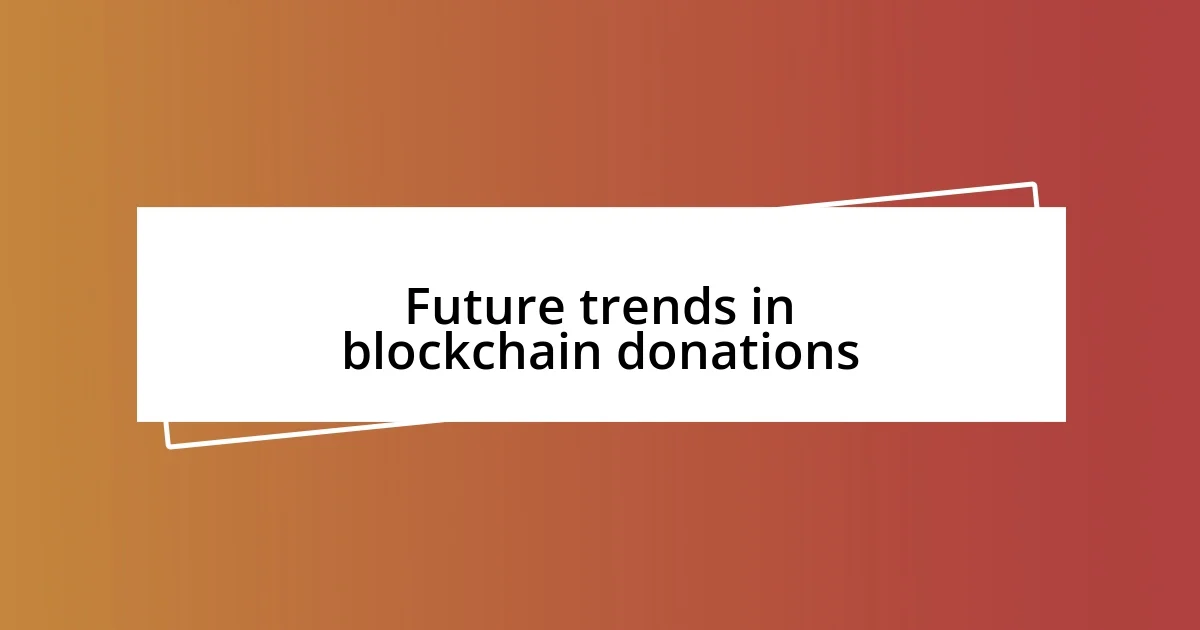
Future trends in blockchain donations
Looking ahead, I see a growing trend toward transparency in blockchain donations. For instance, I once funded a charity project where I received real-time updates on how my funds were being used. It’s thrilling to think about how this level of transparency could reshape trust between donors and organizations. Wouldn’t it be amazing if every charity could offer such detailed insights?
Additionally, I’ve noticed that more organizations are embracing educational initiatives around blockchain technology. I recall attending a workshop where beginners learned how to donate using cryptocurrencies. The excitement in the room was palpable, and it left me hopeful that as knowledge spreads, more people will jump on board. Isn’t it interesting how education can demystify a concept that initially seems daunting?
Lastly, the integration of non-fungible tokens (NFTs) in fundraising has captured my attention. I remember experimenting with NFT art sales to support a local cause, which not only raised funds but also engaged a completely different audience. Thinking about how these digital assets could continue to blend art and philanthropy opens up so many possibilities. Could NFTs be the next wave of unique and personal charity initiatives?
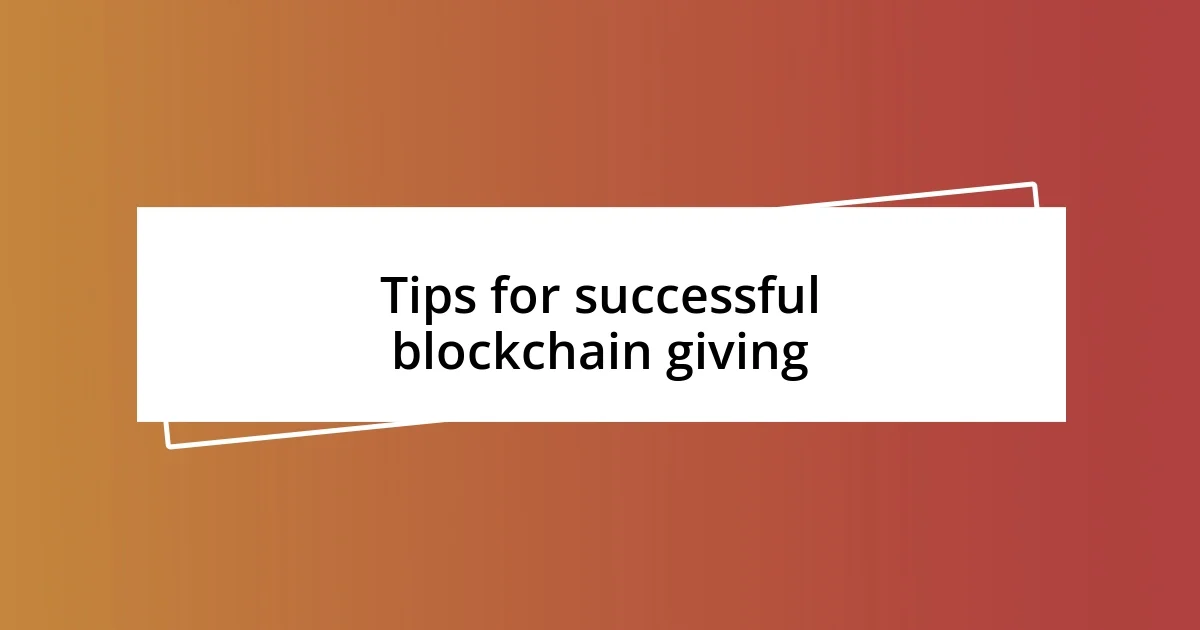
Tips for successful blockchain giving
When it comes to making blockchain giving effective, choosing the right platform is key. I remember my first donation on a platform that promised low fees but ended up having hidden costs. It taught me that transparency in fees is vital; you want to see where your money is going and ensure it maximizes impact. So, always do your homework—research platforms to ensure you’re selecting one that aligns with your values and offers clear insights.
Another tip I’d suggest is to stay informed about the projects you’re supporting. I learned this the hard way when I donated to a promising initiative that later struggled with management issues. Engaging with the charity’s updates, reading reviews from other donors, and following their social media can provide clarity. It’s empowering to see firsthand how your contribution is making a difference, and it keeps you connected to the cause.
Also, consider connecting with others in the blockchain philanthropy community. When I joined a local group focused on crypto philanthropy, I was surprised by the wealth of knowledge and support available. Engaging with like-minded individuals not only enhances your understanding but also fosters collaboration. Have you ever thought about how much more impactful giving can be when you share insights and experiences with others?














